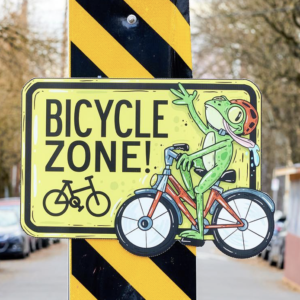NOTE: 5 and 1/2 years later, I have decided to delete this cartoon because now I fully understand how inappropriate its contents were. In hindsight, I regret publishing it. I’m sorry to everyone that was offended by it. — Jonathan Maus, 2/10/17.
— For background, see past coverage of the Williams project. For past cartoons here.







Thanks for reading.
BikePortland has served this community with independent community journalism since 2005. We rely on subscriptions from readers like you to survive. Your financial support is vital in keeping this valuable resource alive and well.
Please subscribe today to strengthen and expand our work.
Equating the civil rights struggle with the struggle for bike lanes? I hope I’m wrong…
Transit equity is most certainly a struggle for social justice.
I think it is more about the progressing, continuing struggle for civil rights, as the surrounding environment changes.
I live in a neighborhood that remembers insult and injury from 4 generations ago. St Johns had a troublesome history of annexation into Portland, and many still remember Grampa cussing up a storm about it.
It’s Grampa’s history, not mine.
The history of Williams is a bit more current than St Johns, but only a bit more so.
At what point do we relegate the past into history, or hang on to it as proof positive that we are being messed with?
The larger issue on Williams is finding that right balance between different modes all vying for the same real estate. Making sure passers through needs are met, as well as locals wanting safe passage around their neighborhood.
Throwing everyone else’s baggage into the mix is their baggage, not mine.
Missing in this is the understanding that its the volume of traffic, not the color of anyones skin.
I’d like you to consider that the issues being raised by people like Ms. Huxley are not problems that are exclusively from the past.
we can relegate the past to history right after we stop lying to ourselves about it.
What is the point here. Is this site not called bike portland?
I usually look for political cartoons to give a fresh outlook or a different twist on a controversy. This one just seems to be restating it.
Thanks for the feedback.
The idea was to show that there are past and current injustices on that street that have yet to be fully dealt with. I wanted to show that some of the same people who fought for social and civic justice back in the day are still asking for it… and now people are asking for traffic justice… and as of yet have not had their voices turned into action.
Thanks for explaining. But if you have to explain a cartoon, it ain’t working.
Came for this; leaving satisfied.
Yeah, I got it: “fifty-odd years later… meet the new boss, same as the old boss… ” (etc.)
This is offensive.
No doubt. Seems like BikePortland needs folks like you and me to simply balance out the white here.
Yes, it’s very offensive. The struggle for civil rights in Portland and the call for a new bike lane on Williams are not even close to being comparable in scope, magnitude, necessity, immediacy, history, legacy, or impact.
Civil rights to a bike lane? Really? Civil rights broadly addressed lynchings, voting rights, Jim Crow segregation… did you know there were legal exclusions against Blacks owning property in Portland… written explicitly in house deeds?
This cartoon’s appearance on one of the most well-recognized mouthpieces of the PDX bike community makes me embarrassed to be associated with cyclists.
This cartoon is racist.
2 things I would like to point out here:
1. The struggle for civil rights in Portland is obviously not over.
2. The artwork on that cartoon betrays a mindboggling amount of ignorance.
Yo Mama,
Where did I say or write that this cartoon is equating the “struggle for civil rights” with the “call for a new bike lane”?
And you even say at the end of your comment, that the “struggle for civil rights in Portland is obviously not over” — that’s exactly what I intended the point of the cartoon to be.
Would also like to know why you feel the artwork shows “ignorance”.
Thanks for the feedback.
The visual analogy makes the comparison intrinsically implicit because that’s the only message in the drawing.
Hi Jonathan,
I appreciate and hear that you created the concept for this cartoon out of good intentions. I hope you also can appreciate the old idea that there is a road paved with good intentions that leads nowhere good at all.
I’ve only been a casual reader over the years, but even I have noticed that the white privilege attitudes prevail here whenever subtle racial issues are discussed. Admittedly, a lot of bicycle culture handles privilege poorly. There has been a pretty recent shift to address white privilege in environmentalism in general as well.
I often think about how transportation justice and environmental justice are the only civil rights movement where I am not only an ally but I’m also fighting for my own rights. That’s a seductive thought to a white boy born and raised in SW Portland, but it’s also one I basically keep to myself because all it really shows to the outside world is that I’ve been extremely fortunate to not have to fight personal institutional discrimination during the 23.5 other hours of my day. Many of my friends and associates over the years are not nearly so lucky because institutionalized racism, sexism, hetero-centrism, and ableism work in our culture in visible and invisible ways.
I show respect for the journeys of others around me by listening more than I speak (another old idea) and by not jumping to a defensive and accusatory stance at those times when someone calls my attention to my own privilege. You should listen to the voices that are saying that this cartoon is in poor taste, if only because environmental justice can’t afford to lose any more potential allies due to misunderstandings.
The best that can be said about this cartoon is that it makes absolutely no sense because it was given no context. I believe this is actually the case. But it also shows ignorance (that’s okay, we’re all ignorant at times) because the most clear interpretation to people outside the author’s worldview is that it’s trying to appropriate the civil rights struggle to serve the cause of a struggle for a mere bicycle lane.
In any event, it’s very clearly appropriating the imagery of the civil rights movement for one reason or another. If you’re going to steal from someone else’s culture, you should make sure that it’s not offensive from their point of view.
This isn’t the first time bikeportland has been tone-deaf on racial issues. Have you considered any ideas on how to engage people of color more prominently with the editorial side of bikeportland? Certainly better inclusion of people of color is an important goal for transportation and environmental justice. Do you think it’s an important goal for bikeportland?
Best.
— Mark
Hi Mark,
It has been over five years since your comment. I don’t remember why I didn’t respond then, but I just wanted you to know that I appreciate your thoughts.
And more importantly, in these past five years – in large part because people like you took the time to enlighten me – i have learned a lot more about everything you rightly accuse me of in your comment. I would never publish a cartoon like this today.